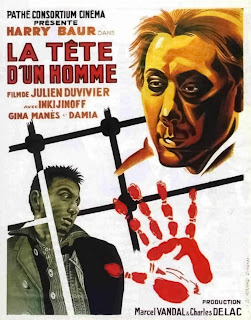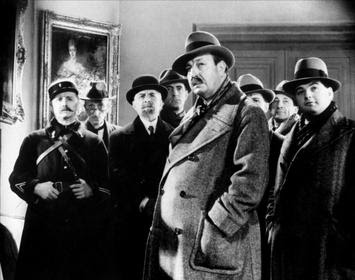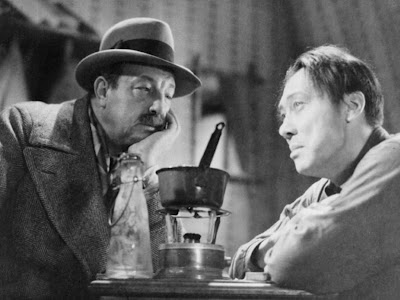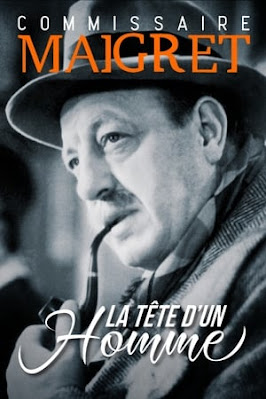A Mans' Neck

Director: Jules Duvivier
Year:
1933
Rating:
8.0
Country: France
Aka - A Man's Head
Aka - La tête d'un homme
Georges Simenon wrote his first Inspector Maigret novel in 1931 and this
was already the third adaptation into a film of his books. But on the other
hand by the end of 1932 he already had seventeen Maigret books gone to press.
Prolific doesn't begin to describe Simenon. He wrote a book about every two
weeks. And they are terrific. The crimes themselves are often not too complicated
but it is his character of Maigret and his descriptions of Paris - the clubs,
the streets, the cafes, the rundown boarding houses - that pull you in. One
of the real strong points of this film is the settings within Paris. You
can almost smell the stale beer and staler perfume. The film begins in a
small neighborhood bar that Willie walks into. The bar is crowded and noisy
with conversations that we only capture snippets of. Willie glad-hands everyone.
People playing belote, others carousing, everyone drinking, cigarette smoke
clouding the air, girls looking for business or a handout, outside a female
newspaper vendor singing out the headlines, men with pencil thin moustaches
looking for a night of fun and trying to capture a glance. Willie can't pay
his bill and has already racked up a debt. He yells out jovially -
if only my aunt would die I would be rich.
And so it begins. A man hears this and drops a note at his feet. 100,000
francs and she is dead. Send me her key. A large slow witted man enters the
house, walks up the stairs and finds her already dead. He just came to rob
her. Now he is stuck with a murder. Set up like a Thanksgiving turkey. Maigret
(Harry Bauer) doesn't fall for it and sets up traps of his own for the real
killer. It is directed by Jules Duvivier, one of France's most revered
directors and the film looks great in its back and white shadings. There
are just some outstanding scenes in the film. The placid implacable Maigret
balanced against the incredible performance by Valéry Inkijinoff,
as the killer Radek slowly slipping into insanity and trying to play mind
games with Maigret. Inkijinoff had headed a few Russian film studios before
he defected to France. Stalin was not pleased. His intensity is hard to take
your eyes off of. Maigret often has little to say - he just listens and stares
- up close - smothering the people he is questioning with his bulky
presence - or not questioning - just staring at them waiting for them to
crack under his gaze.
In a room across from Radek's in the old boarding house a song seeps into
his room. Plaintive and tragic. Every night she sings for the forlorn. He
is obsessed with that voice. He finally bursts into the room to see what
she looks like. Like what he imagines her to be. Instead he finds a middle
aged woman with eyes so heavy with weariness that it must be hard keeping
them open. The singer is Damia, considered the second greatest chanson of
the brokenhearted after Piaf but she actually came a few years before her.
Everything takes on a sense of weariness though, as if life is beating everyone
down. As if there is no coming out of the shadows. As if life never is lit
by the sun. An air of melancholia covers everything in the film.




